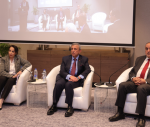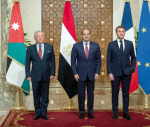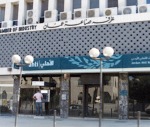You are here
WB extends $500m in finance to support Jordan reforms
By JT - Jun 29,2018 - Last updated at Jun 29,2018
AMMAN — The World Bank (WB) decided to extend $500 million in concessional and non-concessional financing to support Jordan’s ongoing reforms to improve the economy and business climate by reducing business costs, fostering competition and increasing exports.
The financing seeks to support Jordan’s efforts to promote inclusive economic growth, create more jobs and expand the National Aid Fund cash transfer programme to cover an additional 85,000 households, according to a World Bank statement e-mailed to the Jordan Times on Thursday.
The First Equitable Growth and Job Creation Development Policy Loan (DPL) will also expand social safety nets to protect the poorest against economic shocks, boost job creation, and improve access to finance for small- and medium-sized enterprises (SMEs).
The programme will have a specific focus on creating opportunities for young people and women, the WB indicated.
The $500 million DPL consists of a grant of $111 million from the Global Concessional Financing Facility (GCFF) and a non-concessional portion of $389 million.
The non-concessional portion has a fixed spread and a final maturity of 35 years, including a grace period of four and a half years.
“The World Bank reiterates its unwavering commitment to support Jordan at this critical juncture,” Saroj Kumar Jha, World Bank Mashreq regional director, said in the statement.
“The new Jordanian government has the opportunity of a fresh start to build consensus for reforms based on a broad consultative approach. We look forward to supporting Jordan’s efforts to unlock the potential of its human capital, increase its competitiveness, kickstart growth and boost job creation,” the WB official said.
The programme will support reforms to reduce business costs and improve market accessibility as a way of boosting productivity. At the same time, creating flexible and integrated labour markets and better, more efficient social assistance will allow more Jordanians to work, and allow those that do not have employment or decent incomes to benefit from social assistance.
“The broad set of actions stipulated by this programme will set the foundations for higher growth and employment in Jordan,” Christos Kostopoulos, World Bank Lead Economist and Co-Task Team Leader, said in the statement.
“In particular, flexible and part-time work opportunities are expected to promote a higher labour participation rate among women and youth, thus increasing their economic empowerment,” Kostopoulos said.
Launched in 2016, the GCFF provides concessional financing to middle income countries hosting large numbers of refugees at rates usually reserved for the poorest countries. The programme brings the WB group’s total commitments to Jordan to $1.3 billion, of which $1.1 billion is on concessional terms.
Related Articles
AMMAN- The World Bank (WB) decided to extend $500 million in concessional financing to support Jordan's ongoing reforms to improve the econo
AMMAN — The World Bank (WB) will provide Jordan with $250 million in August as part of $500 million in concessional financing to support Jor
AMMAN — The World Bank Group’s Board of Executive Directors has approved a $1.45 billion financing package to Jordan, aimed at stimulating i

Opinion
Apr 07, 2025
Apr 07, 2025
Apr 07, 2025
Apr 06, 2025
- Popular
- Rated
- Commented
Apr 07, 2025
Apr 07, 2025
Apr 07, 2025
Newsletter
Get top stories and blog posts emailed to you each day.















